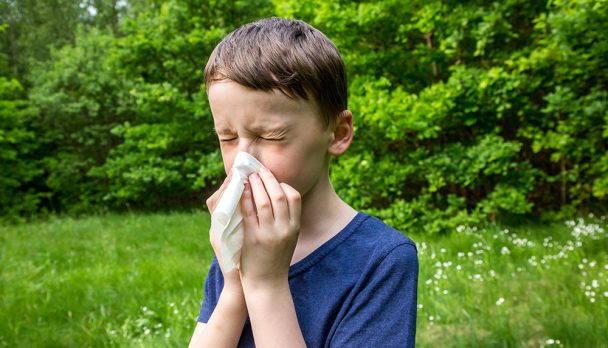Allergic disorders result from an inappropriate, usually IgE-mediated, immune response upon exposure to either environmental or food allergens. Common manifestations of allergy include rhinoconjunctivitis, asthma, eczema, acute urticaria and anaphylaxis.
Disorders, such as chronic urticaria, hereditary angioedema and T-cell contact dermatitis (metal allergy), while clinically similar in some ways, are not IgE-mediated. Allergic disease manifests in different ways through life and the likely causative agents can also change with age (see Table 1).
Tests used in the diagnosis of IgE-mediated allergy
Total IgE
Higher levels of total IgE are often found in patients with allergic conditions. However, normal total IgE does not exclude allergy.
Total IgE is also elevated in other conditions including parasitic infections and allergic bronchopulmonary aspergillosis. It is used increasingly in determining anti-IgE therapy in moderate to severe asthmatics.
Allergen-specific IgE
Allergen-specific IgE can be detected for a large variety of allergens. The presence of a specific IgE to allergen can suggest allergic disease and is detected via a blood test (RAST or radioallergosorbent test) or skin prick test. RAST tests detect many of the different proteins within an individual allergen.
Recombinant allergen testing
Of the many proteins within a substance, only a few may cause allergic symptoms. Recombinant allergen testing looks for specific characterised protein within an allergen.
Interpretation of RAST tests
The presence of detectable specific IgE to an allergen does not confirm the patient is allergic to that substance. All results must be interpreted in conjunction with the clinical history of the patient.
Low levels of detectable specific IgE can confirm the presence of allergy in the right clinical context. RAST testing aids in the assessment of, and identification of allergic sensitisation, but is not to be used alone as the deciding factor for inclusion or exclusion of allergy.
As the level of specific IgE increases, the likelihood of clinical relevance also increases. As shown in Table 2, different allergens have different specific IgE level cutoffs at which serious allergy is >95% likely (positive predictive value or PPV). The range of values is vastly different between allergens and is affected by age and also by geographic region.
Table 2 defines levels at which exposure, or a challenge, would be highly hazardous for a patient. Importantly, many patients could have serious reactions at much lower levels.
[table id=1 /]
[table id=2 /]
RAST tests
RAST tests are available for a range of allergens, however Medicare criteria limits rebates based on the number, type and frequency of tests.
Medicare Australia limits rebates for RAST tests to a maximum of four specific allergens and/or mixes per pathology request and a maximum of four RAST test episodes per year.
When ordering RAST tests, it is advisable to include allergens the patient feels are relevant and those likely for the clinical scenario. For common clinical scenarios we recommend the following:
Childhood eczema
Age <2 years: Milk, Egg, Wheat, Peanut
Age >2 years: Milk, Egg, Peanut, Dust mite
Additional allergens or an extended RAST combined allergy panel may be ordered.
Asthma and allergic rhinoconjunctivitis
Dust mite, Grass mix, Animal dander
Additional allergens may be ordered or substituted if relevant (e.g. cat dander instead of animal dander). An extended RAST inhalant panel is also available.
Default panel if no allergens are specified and no clinical notes are provided
Age <5 years: Dust mite, Grass mix, Food Mix
Age >5 years: Dust mite, Grass mix, Animal Mix
Anaphylaxis
Anaphylaxis is a severe life-threatening allergic reaction. It is recommended these patients require specialist assessment by a clinical immunologist or allergist.
Initial testing should look for the causative allergen if possible. It is important to note that a negative RAST test does not exclude the allergen tested.
RAST testing recommendations
- Test individual likely causative allergen i.e. food, stinging insect.
- Tryptase, if done within 2-6 hours of reaction, can support the occurrence of an allergic reaction.
- Useful as an assessment of mastocytosis (condition with increased numbers of mast cells)
Extended RAST panels
Extended RAST panels have been developed to represent the common allergens encountered clinically in practice. They are particularly relevant in our geographic region and replace the skin prick test panel which is no longer available. Additional allergens may also be requested. All results must be interpreted in conjunction with the patient’s clinical history.
Extended RAST Food Panel
- Covers common food-related allergens
- Almond; Hazelnut; Sesame seed; Banana; Mango; Shrimp (prawn); Cashew; Milk (cow); Soybean; Codfish; Peanut; Walnut; Egg white; Rice; Wheat
Extended RAST Nut Allergy Panel
- Broad collection of commonly consumed nuts, including peanuts
- Individual nut testing with appropriate clinical history is preferred
- Recommend to discuss results with a clinical immunologist or allergist
- Almond; Macadamia; Pine nut; Brazil; Peanut; Sesame seed; Cashew; Peanut (Ara-h2); Walnut; Hazelnut; Pecan
Extended RAST Combined Allergy Panel
- Combination of common food and environmental allergens
- Replaces the skin prick test panel (no longer available)
- Almond; Dust mite; Mould mix; Cashew nut; Egg white; Peanut; Cat dander; Grass mix; Shrimp (prawn); Codfish; Hazelnut; Soy; Dog dander; Milk (cow); Wheat
- * Preferable for children (<12 years) due to low serum volume
Extended RAST Inhalant Panel
- Covers common environmental allergens
- Useful for asthma and allergic rhinitis
- Acacia (wattle); Blomia tropicalis; Dust mite; Alternaria alternate; Cat dander; Eucalyptus; Aspergillus fumigatus; Cladosporium; Horse dander; Bahia grass; Common ragweed; Johnson grass; Bermuda grass; Dog dander; Perennial rye grass
Recombinant allergens
Omega-5 gliadin
- A component of wheat
- Associated with anaphylaxis
- Often in the context of eating wheat and physical activity within 1-2 hours
Alpha-gal (mammalian meat allergy)
- Associated with anaphylaxis; often delayed following consumption of meat (beef, lamb, pork)
- Related to tick bites
Peanut Allergy Risk Assessment
- Peanuts like all food is made up of many different proteins
- Ara-h2 is associated with anaphylaxis to peanut
- Can assist with risk assessment and should be done in conjunction with a clinical immunologist or allergist
- A negative Ara-h2 in peanut positive patient does not imply there is no risk to anaphylaxis
- Results of RAST tests can also be of use in monitoring ongoing allergy in patients in conjunction with their treating clinician
How to order allergy tests
RAST tests - standard panels Medicare Australia limits rebates for RAST tests to a maximum of four specific allergens and/or mixes per pathology request and a maximum of four RAST test episodes per year.
Extended RAST tests (Medicare rebate + $120* per panel)
- Extended RAST Food
- Extended RAST Nut
- Extended RAST Combined
- Extended RAST Inhalant
Please note, extended RAST panels are not bulk billed.
Recombinant allergen tests (Medicare rebate + $60* each)
- Alpha-gal
- Omega-5 gliadin
- Peanut (Ara-h2)
- Peanut Allergy Risk Assessment
General Practice Pathology is a regular column each authored by an Australian expert pathologist on a topic of particular relevance and interest to practising GPs. The authors provide this editorial free of charge as part of an educational initiative developed and coordinated by Sonic Pathology.
Expert/s: Sullivan Nicolaides Pathology










